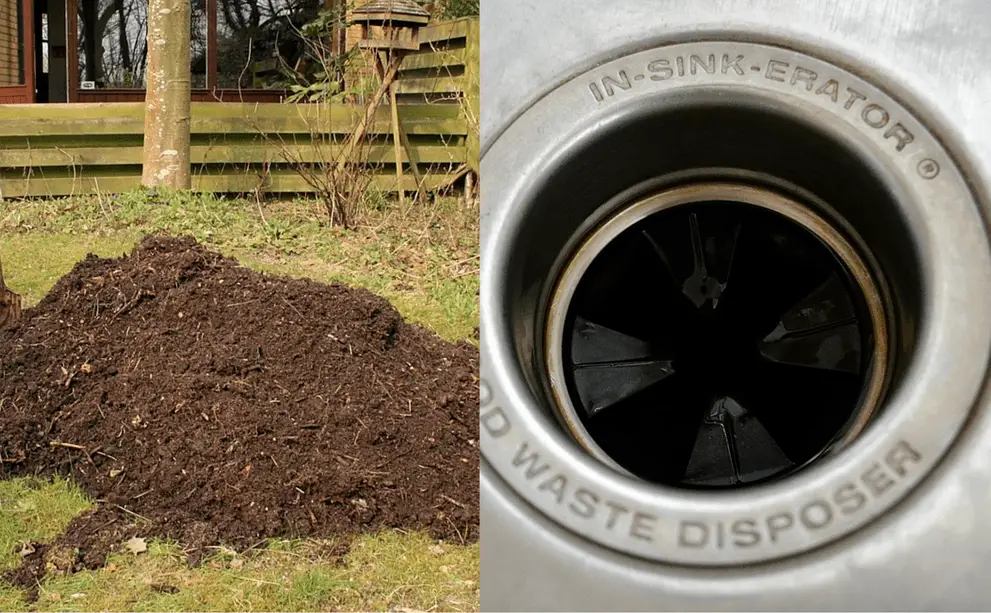Although garbage disposals are convenient, composting has the added benefit of improving soil quality and assisting in erosion control. Additionally, these perks are vital in the fight against food insecurity and local environmental health - and you will not receive them if you dispose of your food down the garbage disposal.
Table of Contents
What is Composting
The process of composting involves the decomposition of organic materials. Compost can then be used as a soil conditioner or for a variety of other purposes.
| Composting – The Pros | Composting – The Cons |
| Soil quality improves | Possible spread of diseases |
| Cheap soil conditioner | Investment required |
| Organic fertilizer | Additional fertilizer may be needed |
| Increased yields | Not for all organic waste |
| Compost is easy to make | Monitoring is needed |
| It’s eco-friendly | It smells bad |
| Less garbage to pick up | It might attract rats, snakes, and bugs |
| Greenhouse gas emissions are reduced | Compost quality depends on the ingredients |
Composting advantages
Due to composting’s ability to reuse large amounts of materials that would otherwise be considered trash, composting is considered quite eco-friendly.
By adding compost to the soil, not only will the soil’s nutrient mix be improved, but the structure of the soil will also be improved.
Compost is also a relatively inexpensive soil conditioner. A compost bin will be the only expense related to composting.
A further advantage of compost is that it is an entirely organic fertilizer. The end product will also be organic since only organic food waste and other organic materials can be composted.
Composting Disadvantages
Investing in composting takes some time at first. Also, composting may only work if you have a lot of organic waste. Composting might not be worth the effort if you only produce low levels of organic food waste.
The composting process can generate a lot of smell, which may decrease your overall quality of life at home.
Composting can also attract a bunch of animals that might harm humans. Compost will likely attract harmless bugs, but it might also attract rats or snakes.
It’s also important to monitor composting to get the best results. Composting might take a long time to decompose food waste into usable compost.
Compost quality depends heavily on organic waste input, so you may need to add fertilizer to optimize yields.
What is Garbage disposal?
With an InSinkErator, you can scrape dirty dishes right into the sink without worrying about clogging your pipes. The convenience of these devices might seem hard to beat, but they also have drawbacks.
| Garbage Disposal – The Pros | Garbage Disposal – The Cons |
| Simplify cleanup | Requires regular maintenance |
| It protects your pipes | Clogs, jams, and breaks |
| Works almost anywhere | Occasional plumber needed |
| Affordable | Use with a lot of care |
Garbage disposal advantages
Food scraps can build up in your pipes over time and cause blockages. By using a garbage disposal, you can grind down food debris into small particles that are less likely to become stuck in the pipes.
Garbage disposals typically cost between $70 and $130, and if you are handy with basic plumbing, you can install them yourself.
You can use garbage disposals with almost every type of sewage system, including municipal sewers and septic tanks.
Garbage disposal disadvanatges
Garbage disposals can only handle light food scraps like banana peels or egg shells, and they need cleaning every week.
Even if you use it correctly, you can still get food particles in the garbage disposal. Eventually, these particles decay and start smelling.
You can also jam your garbage disposal if you drop too much or the wrong type of food down it.
Are garbage disposals bad for the environment?
Garbage disposals reduce the amount of diesel fuel and emissions associated with driving garbage trucks around town and transport uneaten waste to wastewater treatment plants, which can be used to create fertilizer and electricity.
But let’s not get ahead of ourselves. Even though garbage disposals are more eco-friendly than trashcans, they’re not the best way to dispose of uneaten food.
Some critics say disposals can be a problem near water. There’s a lot of nitrogen in food waste, which can be bad for plants and marine life.
Composting or garbage disposal: which one to choose?
Even though putting food scraps in a garbage disposal is better than throwing them in the trash, it still results in solid waste in the water system. Before it can be reused, the water has to be filtered and disinfected, and the biosolids end up in landfills.
Alternately, composting can reduce waste volume, eliminate heat-killed pests, and produce a beneficial and marketable material.
Composting is probably a great idea if you live in a house and have room to start a compost pile. A garbage disposal might be the best option if you live in an apartment or a small house with close neighbors.

